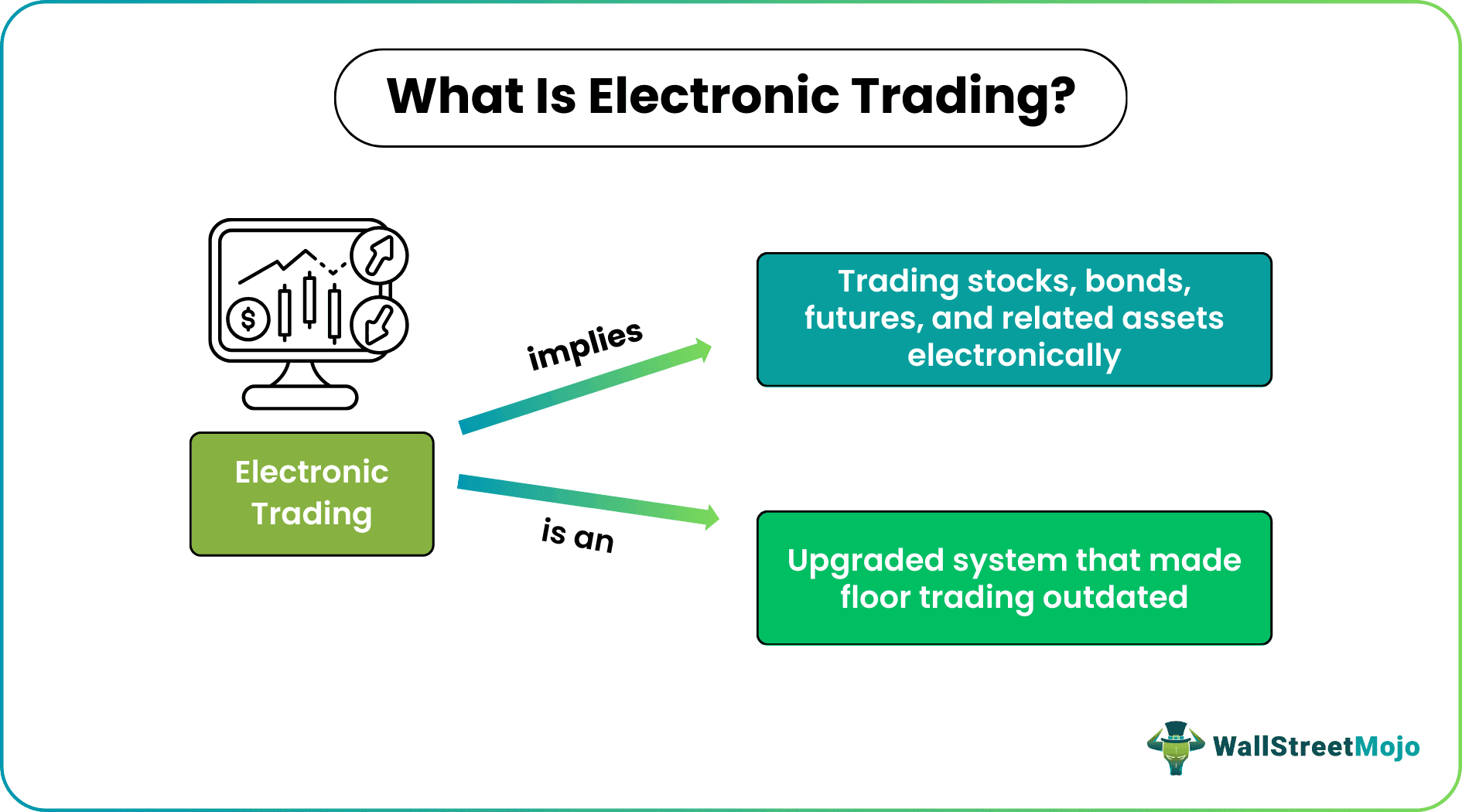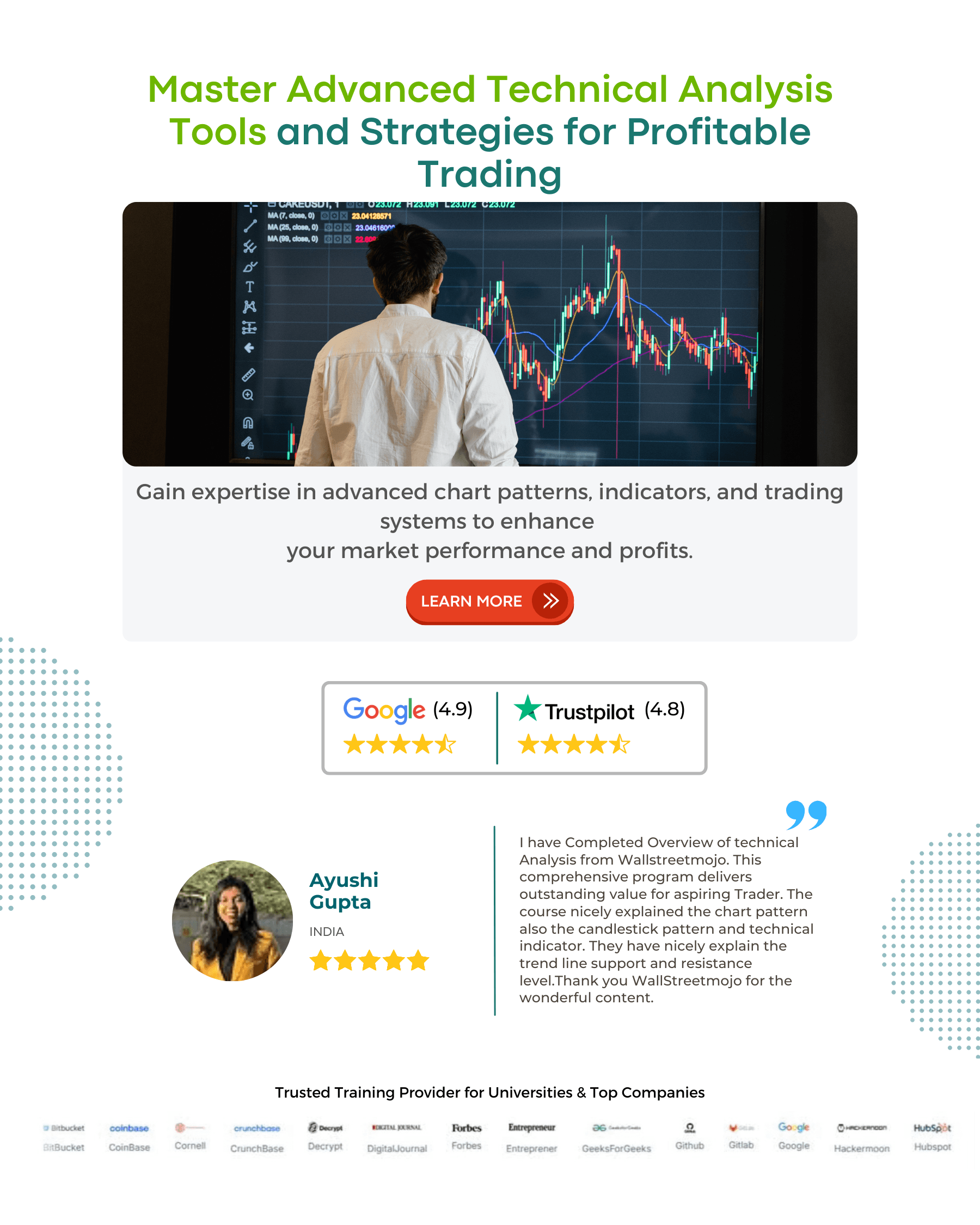Table Of Contents
What Is Electronic Trading?
Electronic trading allows trading online, to participate a trader must first open an account with a brokerage of their choice. During this process, a person will be asked to provide personal information such as their contact details and financial data in order to enable electronic transfers between the bank and the brokerage.

Trading foreign exchange over the internet through online brokers and currency exchanges constitutes "electronic currency trading." It allows dealers to retain worldwide access to the foreign exchange market around the clock, which results in increased trading efficiency at a reduced cost.
Key Takeaways
- In electronic trading, a Depository Trust Company acts as a recordkeeper for all financial transactions conducted by shareholders in the United States. Thus, it safeguards and stores all of the information, and there is no chance it will be lost.
- Trading foreign exchange over the internet through online brokers and currency exchanges constitutes "electronic currency trading."
- Electronic trading allows dealers to retain worldwide access to the foreign exchange market around the clock, which results in increased trading efficiency at a reduced cost.
- Even while not every currency is accessible through electronic trading, the majority of the foreign exchange market's volume is now conducted through electronic means.
Electronic Trading Explained
Electronic trading is mind-bogglingly complicated and lightning-quick at the same time. It gives users immediate access to a vast number of marketplaces and securities. All the reporting features that an investor may want are included in the data support, as are all the data authorities may require. In addition, it contains a safe setting for private account information as well as a repository that is accessible throughout the industry and is meant to ensure that no data is ever lost.
The system is highly dependable despite a large number of transactions. You may use this technical miracle for only a few dollars for each transaction, even though it is a product of the modern day.
To participate in electronic trading, you must first open an account with a brokerage of your choice. During this process, you will be asked to provide personal information such as your contact details and financial data to enable electronic transfers between your bank and the brokerage. Then, when you place an order, the brokerage can engage with all securities exchanges wanting to execute transactions because of the sophisticated technology that enables them to do so.
At the same time, those exchanges can interact with all the brokerages. A large volume of deals is carried out each minute by a computerized matching engine. All the work is stored and can be accessed by investors, market makers, and government regulators to evaluate it.
Many traders use Saxo Bank International to research and invest in stocks across different markets. Its features like SAXO Stocks offer access to a wide range of global equities for investors.
Examples
Let us have a look at the examples to understand the concept better.
Example #1
According to an article published by Bloomberg, record e-trading is helping to bring more liquidity to the market for corporate bonds. Because credit-trading algorithms are becoming more sophisticated, they are gaining market share and making it more straightforward for investors to buy and sell corporate bonds without significantly impacting prices; electronic trading of corporate bonds has reached record levels.
Daily, financial institutions such as banks, money managers, and other market participants transacted an average of $15 billion worth of business bonds online, looking at both investment-grade and high-yield debt. This record amount represents a significant increase compared to the daily average of $12.7 billion in 2021. Last month, over one-third of the trading volume for trash bonds was conducted through online platforms. This is an increase from around one quarter during the same period in the previous year.
Example #2
According to a newswire article, after the failure of the cryptocurrency exchange FTX, which included several billions of dollars, the head of an organization that facilitates electronic trading has called for increased regulation and support for cryptocurrencies and non-traditional assets. FTX may owe billions of dollars to more than a million creditors. Markets fear retail investors and institutional investors will continue to pay a hefty price if the sector does not adopt some form of regulation. Additionally, it explains that laws centered on protecting investors have been assumed in electronic markets.
Benefits
- An investor is afforded a higher degree of control when using an online trading account. The buy and sell orders can be placed at any time the online trader chooses.
- The easiest and most time-efficient way to trade is through an online platform. One can buy and sell stock from a faraway place. It is efficient, hence saving time, and is handy.
- Traders can maintain a remote watch on their investments. It provides sophisticated user interfaces and allows investors to monitor their funds' performance in real-time. They can utilize your phone or your computer when calculating whether they made a profit or a loss.
- It nearly does away with the need for intermediaries. Trading online allows one to trade on their own, unhindered by the intervention of a broker. Because of this, the total costs of trading are reduced. Also, hassles associated with trading are eliminated, making this service far more profitable.
- A greater understanding of the financial markets. It contributes to the habit of being directly concerned about managing one's finances.
Risks
- The possibility of technology interruptions is the first danger associated with doing business online. For example, issues with the hardware, problems with access to the internet, issues with the website, issues with the mobile trading app, etc.
- Hackers are most likely to break into data and exploit trading accounts. Thus access security is significantly The answer is to use two different forms of authentication for your trading account. Also, never leave your trading account signed in and unattended.
- The potential for contamination by viruses and other forms of malware is one factor that has the potential to render your platform for online trading useless. Your best bet is to check that your computer has anti-virus software and software that detect and remove malware. Doing so is the most important thing you can do to safeguard your data.
- It isn't easy to create a secure connection and maintain privacy when accessing an online trading account from a cybercafé or a public Wi-Fi system. These connections are typically not safe, and there is a significant possibility that someone may hack into your account.
Electronic Trading vs Floor Trading
- When engaging in electronic trading, a trader must not go somewhere to make deals physically. For example, in the early days of trading financial assets such as stocks, bonds, options, and futures, the open outcry system was a frequently used trading method.
- In the late 1960s, electronic trading was introduced to the world of trade for the first time. Before those years, the most common form of trading was on the floor.
- Unlike floor trading, execution times in electronic trading are far faster, and mistake rates are significantly lower.
- The buy and sell orders can be placed at any time the online trader chooses. In conventional trading, investors cannot act until they connect to the broker and place their order.
For professional-grade stock and crypto charts, we recommend TradingView – one of the most trusted platforms among traders.
Disclosure: This article contains affiliate links. If you sign up through these links, we may earn a small commission at no extra cost to you.
Frequently Asked Questions (FAQs)
The National Association of Securities Dealers, Inc. (NASDAQ) was the world's first electronic stock market when it was established in 1971. However, it began as an electronic bulletin board instead of a straight-through processing market (STP).
In finance, a computer software application is an electronic trading platform, also known as an online trading platform. This platform allows users to place orders for various financial goods across a connection with a financial intermediary.
Trading in the financial markets through the internet and personal computers is known as electronic trading. The user can look for stocks listed on several exchanges, choose the broker that provides the best price, and engage in simple trading. In addition, users can select a trading platform and begin placing various share trading orders immediately.

